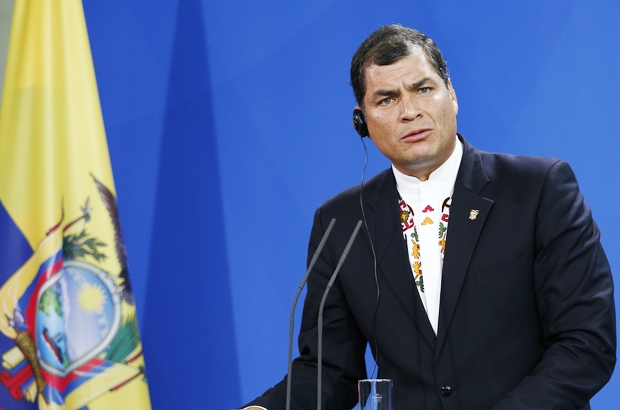Index relies entirely on the support of donors and readers to do its work.
Help us keep amplifying censored voices today.
Proposed laws will not calm President Correa’s stormy relationship with the press, says Padraig Reidy

Ecuadorian president Rafael Correa. Pic: Reynaldo C Paganelli/Demotix
 Wikileaks founder Julian Assange has been granted political asylum in Ecuador. The Australian national, who has been living in the Ecuadorian embassy in London for two months after breaching his bail conditions in the UK, is wanted in Sweden, where allegations of sexual assault have been made against him. The Ecuadorian foreign ministry said it was not confident that Assange would not be extradited to the United States should he return to Sweden. Assange has been heavily criticised in the US for publishing secret diplomatic cables, but as yet no charge has been brought against him.
Wikileaks founder Julian Assange has been granted political asylum in Ecuador. The Australian national, who has been living in the Ecuadorian embassy in London for two months after breaching his bail conditions in the UK, is wanted in Sweden, where allegations of sexual assault have been made against him. The Ecuadorian foreign ministry said it was not confident that Assange would not be extradited to the United States should he return to Sweden. Assange has been heavily criticised in the US for publishing secret diplomatic cables, but as yet no charge has been brought against him.
Private Bradley Manning, alleged to be the source of the cable leak, has been in the US since July 2010, where he faces several charges including “aiding the enemy”.
Ecuadorian president Rafael Correa has previously appeared as a guest on Julian Assange’s Russia Today interview programme. The South American country has faced criticism for its record on free speech.
UPDATE: The British Foreign Office has released this statement
We are disappointed by the statement from Ecuador’s Foreign Minister that Ecuador has offered political asylum to Julian Assange.
Under our law, with Mr Assange having exhausted all options of appeal, the British authorities are under a binding obligation to extradite him to Sweden. We shall carry out that obligation. The Ecuadorian Government’s decision this afternoon does not change that.
We remain committed to a negotiated solution that allows us to carry out our obligations under the Extradition Act.
Ecuadoran President Rafael Correa has personally attacked Gustavo Cortez, editor of the leading daily newspaper El Universo. During a TV broadcast on Saturday the President accused the newspaper editor of being “wicked” and “of having bad faith.” Whilst showing a photograph of the editor, Correa called on the people of Ecuador to remember Cortez as a “clear example of the bad press in the country.”
Critical TV and radio stations in Ecuador have been closed down, after authorities stormed the offices and seized equipment. Authorities of the Police and the Telecommunications Superintendence (SUPERTEL) in the North East of Ecuador closed TV station Lidervisión and Radio Líder. They arrived at Lidervisión headquarters with a warrant from SUPERTEL, and proceeded to search the office, breaking and confiscating broadcasting equipment. The radio and TV stations’ owner, Edison Chávez, says the stations were closed after falling behind on concession fees. But the he owner of the radio and TV frequencies has claimed that the closures were politically motivated.